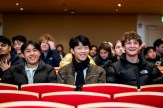Learning to build more sustainable lives
A month-long field study in sustainability to Costa Rica this past spring got off to a shaky start — mudslides turned a 40-mile car trip into a four-hour adventure — but it yielded a transformative experiential learning opportunity for the nine Northeastern students who participated.
The students attended classes on calculating carbon footprints, eco-effectiveness, how local businesses succeed, and sustainability of the food chain, and took on projects that strengthened both their education and the local community.
“They became immersed in a different culture, a different set of values, not only from their classroom experience but also the work they did,” said Ron Whitfield, a lecturer in the College of Business Administration, who led the trip. “They were taken out of their comfort zone and returned home transformed in their daily lives.”
Sustainability, health, and security, represent the university’s overarching research themes as Northeastern scientists pursue use-inspired research to solve global and societal challenges in these areas.
The field study came about through a partnership with EARTH University, an international agricultural university that teaches sustainable practices. In one major project, Northeastern and EARTH students teamed up to study whether to reopen a nearby mango processing plant or relocate it elsewhere. They had to factor in the financial, environmental, and social ramifications of the plant’s location, as well as how far tractors would transport the mangoes to the plant and local shops.
The students also built a playground at a one-room schoolhouse using recycled materials. They collected items such as used tires, wood, and rope to build a seesaw and hopscotch court and hang a tire swing from a tree. They hiked to a nearby reservoir to learn about water management. EARTH University itself even served as a learning tool—the campus uses biodigestors to transform animal waste and other refuse into methane gas, which is used for cooking and generating electricity.
The Northeastern students got a truer sense of the Costa Rican culture when they lived for several days with local families, where they had opportunities to teach as well as learn. In one instance, students living on a Macadamia nut farm used their engineering background to lead an experiment aimed at extracting and collecting the oil from bad nuts that are normally wasted — which the farm’s owner can sell oil to cosmetics and food companies.
Pabel Martinez, an economics major, said the trip was an eye-opening experience that has prompted changes in his daily life. He said that he now pays much more attention to his home electricity usage, and he enrolled in an environmental economics course this fall, when he enters his third year at Northeastern.
“I think it’s so important for anybody to go abroad and experience life outside your own little world in the United States,” Martinez said.





